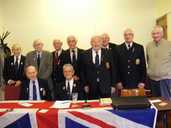Story: John Mellor
The 6th June 1944 marked ‘the beginning of the end’ of the second World War when the full weight of the Allied armies, navies and air forces attacked German forces in Europe in what was codenamed “Operation Overlord”.
This involved a massive embarkation of 130,000 troops from the south coast of England across the English Channel to the beaches of Normandy in northern France.
Local Burngreave resident, Ken Riley, is the chairman of the Sheffield Normandy Veterans Association which is organising a return trip, in rather more peaceful conditions, to the beaches where they landed 70 years ago. It is planned for a coachload of veterans, with families and supporters, to travel to France at the beginning of June for what will probably be the last major commemoration of this historic event.
Veterans of the Normandy landings still have vivid memories of their experiences. Douglas Parker, at the age of 19 with the East Yorkshire Regiment, was among the first infantry group to land on Sword beach. Their orders were to make the beach safe ‘irrespective of casualties.’ He still has a copy of the message which General Montgomery gave to the troops before they left England, in which he said: "The time has come to deal the enemy a terrific blow in Western Europe. The blow will be struck by the combined sea, land and air forces of the Allies – together constituting one great allied team under the supreme command of General Eisenhower.
"On the eve of this great adventure I send my best wishes to every soldier in the Allied team. To us is given the task of striking a blow for freedom which will live in history and, in the brighter days that lie ahead, men will speak with pride of our doings. We have a great and righteous cause. Let us pray that ‘the Lord mighty in battle’ will go forth with our armies and that His special providence will aid us in the struggle.
“I want every soldier to know that I have complete confidence in the successful outcome of the operation we are about to begin. With stout hearts and with enthusiasm for the contest let us go forward to victory.” When Douglas landed on the beach, he recalls seeing machine gun bullets hitting the sand in front of him. “I threw myself down behind an obstacle but fortunately the bullets were spraying to the left and right of me. As I ran up the beach I saw a wounded comrade who said, ‘Help me, Doug.’ He was in a bad way. I dragged him up the beach and laid him behind a small wall on the promenade and called to the medics to attend to him. His name was Corporal Wilkinson and sadly he died. He is buried in Hermanville Cemetery with other East Yorks comrades who were killed in the landing. I have visited this cemetery many times. We fought our way off the beach, moving forward all day until late at night. The struggle across the beach, the noise and the casualties were indescribable and something I will never forget. It was the longest day of my life”.
Other veterans arrived on the Normandy beaches, at a later stage in the invasion. Gordon Drabble, secretary of the Sheffield NVA and the brother-in-law of Rev Don Sparkes, a former vicar of Christ Church, Pitsmoor, was part of a decoy group waiting in Dover with the aim of misleading the Germans that the landings were going to be near Calais – a tactic that worked.
Gordon remembers: "The original date set for D-Day was 5th June but storms in the English Channel forced a postponement to the following day – even then there was a lot of sea sickness among the troops. A few days later we landed on Gold Beach and concentrated on the Caen area which should have fallen on D-Day but was so heavily defended that it didn't fall until 7th July. For most of us 18/19-year-olds, this was our first experience of battle; no amount of training can prepare someone of that age for the horrors of the battlefield.
On one day we lost three sergeants, one of whom was standing next to me. I remember thinking ‘there but for the grace of God…’ When you think of the high casualty rate (more than 200,000 killed or wounded over a two-month period) anyone who is alive today is very lucky. This is why I'm returning for the 70th anniversary – to remember those we left behind. You never forget them."
The Messenger local history group is involved in a project to record the battlefield experiences of as many local veterans as possible. If anyone reading this is a war veteran or knows of anyone among their family or friends who is, please get in touch with the Messenger.


Logged in users of the website can add comments to this page.
Login to this site if you'd like to add a comment. Sign-up for an account if you are not currently a member.